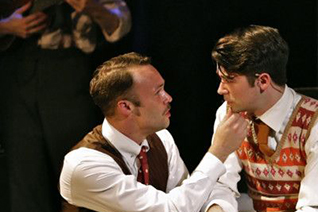Miss Nightingale: The Musical
Miss Nightingale: The Musical
The Vaults Theatre, London, U.K., April 28, 2017
Reviewed by Thanasis Kalantzis for Cabaret Scenes

Conor O’Kane and Nicholas Coutu-Langmead
Photo: Keith Mindham
Miss Nightingale: The Musical is the beloved first child of Matthew Bugg, which started life as a small-scale chamber musical in 2011. Since then, it has been treated with edits and different casts and it’s now going through its fifth incarnation at its new home in The Vaults under the Waterloo train station—a most fitting venue.
It’s a love story between two men in London during the first years of WWII (1942), at the time when homosexuals had to fight “the enemy within” and their acts were punishable for gross indecency. Frank (Nicholas Coutu-Langmead), an upper class ex-pilot and current club owner, falls in love with a Polish Jewish refugee and songwriter, George (Conor O’Kane). Maggie Brown (Tamar Broadbent), a nurse by day with big singing aspirations, is George’s flatmate. She is discovered by Frank and is hired to sing in his nightclub where she adopts the stage name Miss Nightingale. The two men’s love story, having evolved in the shadows, unavoidably attracts blackmail by Maggie’s ex (Niall Kerrigan), a twist that’s bypassed by Maggie’s intervention towards the end of the show.
There are some hilarious songs, written to be performed specifically in a cabaret nightclub environment, overflowing with innuendo and not for the faint-hearted, such as “The Pussy Song” and “The Sausage Song,” while others, such as “Mister Nightingale” and “This Man of Mine,” are wonderfully expressive of the protagonists’ feelings. And then there are the narrative ones that push the story forward. With “Stand Up and Be Counted” and its twin usage as a coming out/join the war hymn, the story falls into place and the characters meet their fates.
Coutu-Langmead, a solid singer in his own right, is totally believable as the man who tries to balance his amorous feelings towards another man, and the steps he has to take to avoid a scandal that would stain his social standing in a closeted society. His character, effectively developed, makes us wonder if he is going to accept who he really is, or not, and lose his soul altogether. On the other hand, O’Kane’s George feels unnecessarily exaggerated, at times even histrionic, and his struggles fail to transmit convincingly. Broadbent may have a good, strong voice, but her character leaves a lot to be desired in its development. There were times that I could not understand if her motives were ulterior — or actually understand them at all. Also, I did not get from her that fierce, in-your-face personality that she is supposed to possess—Broadbent is too agreeable for all that.
There is something to be said about the effectiveness of writers who direct their own work, and produce it, and Matthew Bugg, a newcomer in the profession, seems to have lost sight of how to consolidate the different components he is trying to juggle. This is a good story and the feelings it tries to convey are true, but the book has flaws. I believe that Miss Nightingale‘s impact could have been much stronger if the responsibilities of the production had been spread out more.
Carla Goodman’s set design captures beautifully the spirit of the lost era.
Miss Nightingale: The Musical is running through May 20.
Category: London, London Musical Theatre Review, Musical Theatre Reviews, Off-Broadway Reviews, Regional






